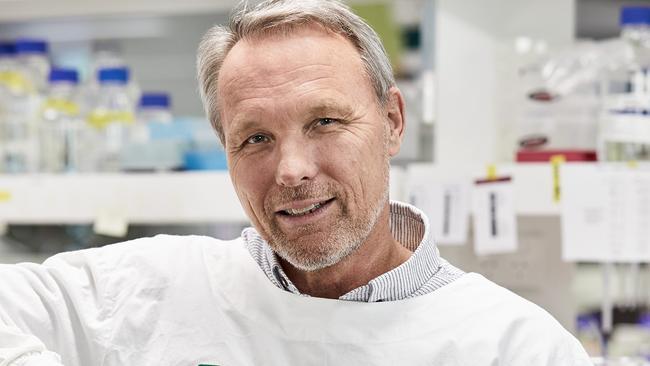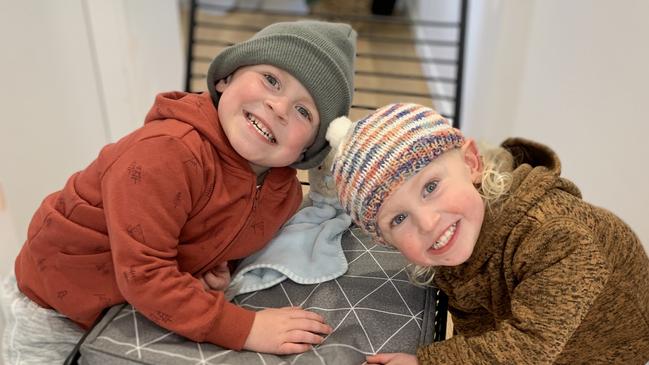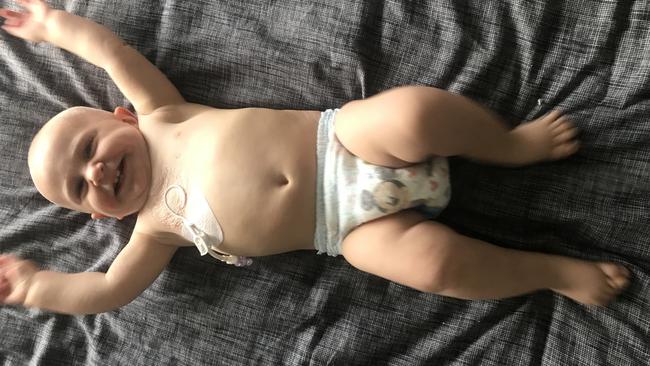Gene therapy could prevent deadly childhood cancer neuroblastoma
A childhood cancer that claims the lives of half its victims could be prevented thanks to an amazing discovery by Australian researchers.
Health
Don't miss out on the headlines from Health. Followed categories will be added to My News.
Exclusive: A deadly childhood cancer may be on the way to being completely prevented thanks to a major breakthrough by Aussie researchers.
A day after the federal government announced it would fund a $500,000 lifesaving treatment for neuroblastoma, the Children’s Cancer Institute has – in a second win – identified a gene that could ultimately wipe out the condition.
Around 40 Australian preschoolers each year develop neuroblastoma, which develops in nerve tissue and comes with a less than 50 per cent chance of survival.
By blocking the gene, known as RUNX1T1, researchers found they could stop the development of tumours in mice bred to develop neuroblastoma.
Professor Murray Norris, who led the research published on Friday in the medical journal Nature Communications, described the results as “a major finding”.
“This work opens up entirely unexplored avenues for the development of new therapeutic approaches for neuroblastoma, and quite possibly other cancers as well,” he said.

The RUNX1T1 gene also plays an important role in adult small cell lung cancer and rhabdomyosarcoma.
The breakthrough was the result of a 10 year journey and the race is now on to develop the discovery into a therapy that could stop the cancer ever occurring.
“There is a possibility of using silencing RNA (Ribonucleic acid, which has structural similarities to DNA) that you can actually inject into the patient that specifically binds to your gene of interest, and then stops it from being produced in the first place,” Prof Norris said.
This type of targeted treatment, if it was proved to work, could eventually be offered to women from families with a high risk of neuroblastoma to prevent the cancer in their children.
Switching off the RUNX1T1 gene in children who have already developed the cancer could also be tried as a treatment.
It might help their immune system recognise the cancer and fight it off.
Prof Norris who has been working on childhood cancer for 40 years said more research is needed before these treatments are available in the clinic.
“It has been an exciting process, but as I said, has been a long process and we’re, we’re really happy that it’s about to be published,” he said.

Sydney mum Jill May said she was “blown away’ at the idea neuroblastoma could one day be prevented.
Her son Huon was diagnosed with neuroblastoma at just 10 weeks of age and was plunged into multiple harrowing rounds of chemotherapy treatment,
Expecting to be prescribed a stronger dose of colic medication when her baby was unsettled Ms May was dumbstruck when she was told Huon’s liver was five times the normal size.
“The pediatrician said he could see a tumour down his down his throat blocking 50 per cent of his airway,” she said.
“You feel like you’re in a movie or you feel like you’re out of body experience going, ‘is this really happening?’.”

Seven years on Huon is the tallest in his school year, he’s playing rugby league and is obsessed with mountain bike riding and scooter parks.
“He’s a bruiser, and he’s just thriving, absolutely thriving, we are so blessed that he’s still here, because this cancer is it’s deadly,” Ms May said.
“If they can avoid these kids even getting the cancer in the first place by finding this gene. The impact these families is just going to be astronomical. They won’t have to go through the torturous journey of seeing their child go through chemotherapy, it’s just going to be fantastic.”
More Coverage
Originally published as Gene therapy could prevent deadly childhood cancer neuroblastoma





